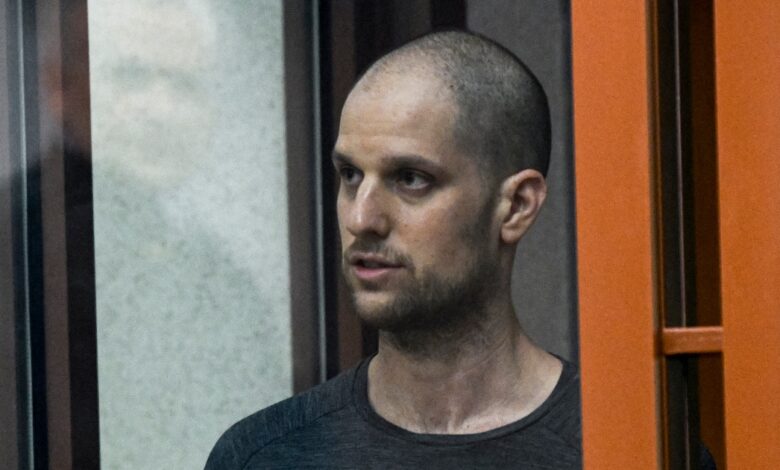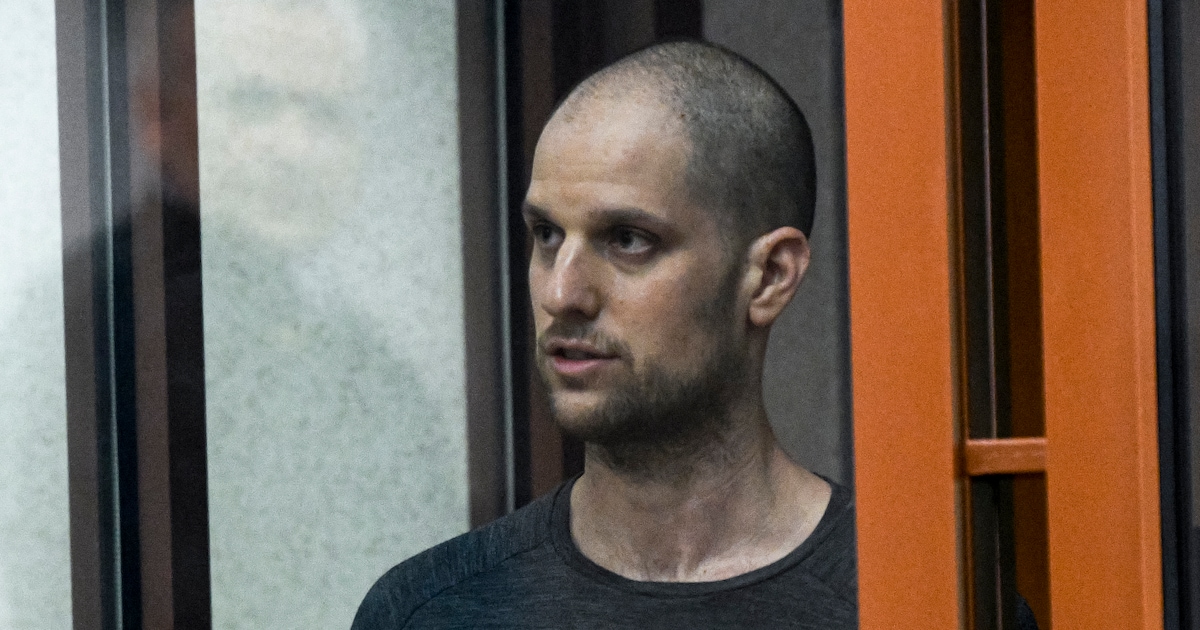
The Deal That Freed Evan Gershkovich More Than a Swap
The deal that freed Evan Gershkovich was not just a prisoner swap; it was a complex geopolitical chess match played out on the world stage. This wasn’t a simple exchange of one person for another; it involved intricate negotiations, unspoken concessions, and a delicate balancing act between national interests and humanitarian concerns. We’ll delve into the intricacies of this deal, exploring the hidden agendas, the international pressure, and the lasting implications for US-Russia relations.
Prepare to have your understanding of this high-stakes event completely reshaped.
The release of Evan Gershkovich, a Wall Street Journal reporter unjustly imprisoned in Russia, captivated global attention. The narrative surrounding his freedom, however, quickly revealed layers beyond a straightforward prisoner exchange. This blog post analyzes the geopolitical context, the nature of the “deal,” the role of international actors, the media portrayal, and the long-term impact on US-Russia relations, providing a comprehensive look at this significant event.
The Geopolitical Context of the Gershkovich Release
The release of Evan Gershkovich, a Wall Street Journal reporter imprisoned in Russia on espionage charges, unfolded against a backdrop of deeply strained US-Russia relations. This event, while seemingly a simple prisoner exchange, reveals a complex interplay of geopolitical factors, strategic calculations, and underlying tensions that have defined the relationship between the two superpowers for years. The exchange itself, though seemingly straightforward, is a significant data point in understanding the current state of this volatile relationship.The specific events leading up to the release involved a prolonged and likely highly secretive negotiation process.
While details remain scarce due to the sensitive nature of the discussions, it’s clear that the Biden administration prioritized Gershkovich’s safe return. This priority was likely weighed against other geopolitical considerations, such as ongoing support for Ukraine and broader efforts to manage the escalating conflict with Russia. Key players included high-ranking officials from both the US and Russian governments, potentially involving intermediaries from neutral countries to facilitate communication and maintain a degree of secrecy.
The motivations driving the Russian side are less transparent, but likely involved a combination of strategic leverage, domestic political considerations, and perhaps a desire to de-escalate tensions, at least marginally.
The Role of US-Russia Relations in the Exchange
The release occurred amidst a period of heightened tensions between the US and Russia. The ongoing war in Ukraine, Russia’s invasion of the country, and the subsequent imposition of sweeping sanctions against Russia have created a highly adversarial environment. The release, therefore, can be interpreted as a small, carefully negotiated window of cooperation amidst a much larger landscape of conflict.
The fact that the exchange happened at all suggests that, despite the profound differences and animosity, channels of communication and a degree of pragmatism still exist between the two nations. This pragmatic approach, however, should not be misinterpreted as a sign of broader reconciliation or a shift in the overall geopolitical dynamics.
Comparison with Previous Prisoner Exchanges
This release shares some similarities with previous prisoner exchanges between the US and Russia, particularly the use of back-channel diplomacy and the involvement of intermediaries. However, the specific circumstances surrounding Gershkovich’s case differ significantly. Unlike some previous exchanges involving individuals accused of less politically sensitive crimes, Gershkovich’s case involved allegations of espionage, adding a layer of complexity and potentially higher stakes to the negotiations.
The Gershkovich prisoner exchange felt strangely symbolic, hinting at a larger geopolitical chess game. It made me think about the precarious situation in the Middle East, and the chilling question posed in this article, the middle easts bizarre waiting game ceasefire or armageddon , about whether we’re headed for a ceasefire or something far worse. This uncertainty, this feeling of a tense standoff, mirrors the complexities surrounding the deal; it wasn’t just a simple swap, but a move in a much larger, and potentially more dangerous, game.
Previous exchanges, often involving less prominent individuals, may have been less publicly scrutinized and subject to less intense media coverage. The high-profile nature of Gershkovich’s case and the global attention it garnered likely influenced the negotiation process and its ultimate outcome. The speed of this release, compared to previous protracted exchanges, also suggests a unique set of circumstances influencing the decision-making process on both sides.
The Gershkovich release, while seemingly a simple prisoner swap, felt far more complex. I’ve been thinking a lot about the geopolitical chess match involved, and it made me wonder about the behind-the-scenes maneuvering; reading up on the subject, I stumbled upon some fascinating insights in books that probe the secrets of the Mossad, books that probe the secrets of the mossad , which offer a glimpse into the intricate world of intelligence operations.
This whole situation highlights how much we don’t know about the quiet diplomacy that shapes international events.
The Nature of the Deal

The release of Evan Gershkovich wasn’t a simple prisoner swap, the kind often depicted in spy thrillers. While the exchange of Gershkovich for a Russian citizen, Vadim Krasikov, was the most visible aspect, the underlying negotiations likely involved far more complex and subtle elements. The very fact that the deal happened at all, given the fraught geopolitical climate, suggests a degree of unspoken understanding and perhaps even concessions beyond the immediate exchange.The public narrative focuses on the one-for-one exchange, but the timing and context suggest a broader agreement.
The silence surrounding specific details hints at a potential quid pro quo that goes beyond the official narrative. The release likely involved protracted negotiations, back-channel diplomacy, and possibly compromises on both sides that remain undisclosed for strategic reasons. This opacity is common in such sensitive diplomatic situations, where transparency could undermine future negotiations or compromise national security interests.
The Gershkovich release wasn’t a simple swap; geopolitical maneuvering was clearly at play. It seems tied to broader power dynamics, perhaps even influencing negotiations with Vietnam, where the recent rise of their new leader, a fascinating figure described in this article as a “hardman capitalist hedonist” vietnams new ruler hardman capitalist hedonist , might be a key piece of the puzzle.
Ultimately, the Gershkovich deal likely reflects a complex web of international relations far beyond a straightforward prisoner exchange.
Potential Concessions and Agreements
The absence of detailed information regarding the release necessitates a cautious approach to speculation. However, considering the geopolitical context and the high stakes involved, it’s plausible that both the US and Russia made concessions beyond the prisoner exchange itself. For instance, the US might have made implicit or explicit assurances regarding future actions or policies related to Russia, such as a softening of sanctions in specific areas, a less confrontational stance on certain issues, or a commitment to future dialogue.
Similarly, Russia might have made concessions related to its actions in Ukraine or other areas of geopolitical contention. The exact nature of these potential concessions remains unknown, and any attempts to definitively Artikel them would be purely speculative. The lack of transparency is itself significant, indicating a deal far more intricate than a simple swap.
Implications of Hidden Agreements
The potential existence of unspoken agreements carries significant implications. These hidden elements could influence future US-Russia relations, potentially creating a foundation for further dialogue or conversely, fueling distrust and exacerbating tensions. For example, if the US made significant concessions, it could face criticism for appearing weak or for compromising its principles. Conversely, if Russia perceived the deal as a sign of weakness from the US, it could embolden further assertive actions.
The long-term effects depend heavily on the undisclosed elements of the deal and how both countries choose to interpret and leverage the outcome. The lack of transparency inherently increases the risk of misinterpretations and unintended consequences, potentially impacting future negotiations and the broader geopolitical landscape.
Analyzing the Narrative Surrounding the Release
The release of Evan Gershkovich after nearly 10 months of imprisonment in Russia sparked a whirlwind of commentary and analysis. Understanding the narrative surrounding his release requires examining the timeline of events, the diverse perspectives offered, and the media’s role in shaping public perception. The story is far from simple, involving geopolitical maneuvering, conflicting narratives, and significant media interpretation.
Timeline of Key Events
The Gershkovich case unfolded rapidly, with significant events shaping the narrative from arrest to release. This timeline highlights the crucial moments that defined the public discourse.
- March 29, 2023: Evan Gershkovich, a Wall Street Journal reporter, is arrested in Yekaterinburg, Russia, on espionage charges.
- March 30, 2023: The U.S. government officially condemns the arrest, demanding his immediate release.
- April 2023 – July 2023: Negotiations between the U.S. and Russia take place behind closed doors, with limited public information released.
- July 2023: A possible prisoner exchange is discussed in the media, with various names circulating as potential candidates.
- October 26, 2023: A prisoner exchange takes place, resulting in the release of Evan Gershkovich in exchange for a Russian national convicted of drug trafficking in the United States.
- October 27, 2023: Gershkovich returns to the United States, where he is greeted by family and officials.
Competing Narratives Surrounding the Release
The narrative surrounding Gershkovich’s release was multifaceted, reflecting different perspectives from the involved parties and observers.
- The U.S. Government’s Narrative: Focused on securing the release of an unjustly imprisoned journalist, emphasizing the importance of protecting American citizens abroad and upholding journalistic freedom. This narrative highlighted the success of diplomatic efforts, despite the complexities of negotiating with Russia.
- The Russian Government’s Narrative: Framed the release within the context of a prisoner exchange, avoiding explicit acknowledgement of Gershkovich’s innocence. This narrative emphasized Russia’s willingness to engage in negotiations while maintaining its stance on the original charges against Gershkovich.
- The Media’s Narratives: Media outlets presented a variety of interpretations, ranging from celebratory coverage of Gershkovich’s release to critical analyses of the prisoner exchange’s implications for future diplomatic relations. Some media outlets focused on the human interest story of Gershkovich’s ordeal, while others analyzed the geopolitical context and potential consequences.
Media Portrayal and Interpretations
The media played a crucial role in shaping public perception of the event. News coverage varied significantly across different outlets, reflecting differing ideological leanings and journalistic approaches. Some media emphasized the triumph of diplomacy, showcasing the successful negotiation and the return of Gershkovich. Others focused on the controversial nature of the prisoner exchange, raising questions about the precedent set and the potential implications for future hostage situations.
The potential for bias was evident in the selection of experts interviewed, the framing of the story, and the emphasis on certain aspects of the narrative over others. For example, some outlets highlighted the human cost of the situation, while others emphasized the broader geopolitical implications.
The Impact on Future US-Russia Relations: The Deal That Freed Evan Gershkovich Was Not Just A Prisoner Swap
The release of Evan Gershkovich, while a significant humanitarian victory, leaves a complex and uncertain legacy for US-Russia relations. The nature of the deal itself – shrouded in secrecy and lacking a clear reciprocal exchange – casts a long shadow over future interactions, raising questions about trust and the potential for similar situations to arise. The immediate impact is palpable, but the long-term consequences remain to be seen, potentially shaping the trajectory of diplomacy and conflict for years to come.The event’s impact on future negotiations and diplomatic efforts will likely be multifaceted.
On one hand, the successful resolution, however unconventional, could provide a framework for future prisoner exchanges, potentially fostering a degree of pragmatic cooperation on specific humanitarian issues. Conversely, the lack of transparency surrounding the deal could deepen existing mistrust, hindering broader efforts to address more complex geopolitical challenges. The precedent set – a seemingly one-sided release without a clear quid pro quo – might embolden Russia in future negotiations, while simultaneously making the US more cautious in engaging in similar prisoner exchange scenarios.
Potential Future Scenarios
The Gershkovich release presents several potential future scenarios for US-Russia relations. One scenario involves a cautious but pragmatic approach. Both countries might limit engagement to narrowly defined areas like prisoner swaps or arms control verification, avoiding broader dialogue where disagreements are deep and entrenched. This resembles the cautious relationship maintained during the Cold War, with limited cooperation confined to specific areas of mutual interest.
Conversely, a more optimistic scenario could see a gradual thawing of relations, driven by a shared need to address global challenges like climate change or nuclear proliferation. This could lead to increased dialogue and cooperation on issues where common ground exists, mirroring the period of détente during the Cold War. A pessimistic scenario, however, envisions a further deterioration of relations, with both countries retreating into increasingly hostile postures.
This could manifest in heightened military activity, increased cyber warfare, and a renewed escalation of rhetoric, potentially reminiscent of the height of Cold War tensions. The actual trajectory will depend heavily on future actions and decisions made by both governments, influenced by domestic political pressures and evolving geopolitical circumstances. The lack of transparency surrounding the Gershkovich release, however, introduces an element of unpredictability, making it difficult to definitively predict the future course of the relationship.
The Human Element

Evan Gershkovich’s ordeal transcended the geopolitical chessboard, revealing the profound human cost of international conflict. His imprisonment, a stark reminder of the fragility of freedom, left an indelible mark on him and his loved ones. Understanding his experience offers a crucial counterpoint to the strategic analyses that often dominate discussions of such events.Gershkovich’s experience in Russian custody remains shrouded in some secrecy, as details have emerged gradually.
Reports suggest he endured solitary confinement, limited access to legal counsel, and the constant stress of an uncertain future. The conditions of his detention, while not fully disclosed, are understood to have been harsh, typical of those faced by political prisoners in Russia. The lack of consistent access to family and the uncertainty about the charges against him added to the psychological strain.
He was reportedly interrogated extensively, facing pressure to confess to espionage charges he vehemently denied. Accounts suggest that he maintained his journalistic integrity throughout his ordeal, refusing to compromise his principles.
Gershkovich’s Psychological and Emotional Impact, The deal that freed evan gershkovich was not just a prisoner swap
The psychological and emotional toll of prolonged imprisonment, particularly in such circumstances, is immense. The isolation, uncertainty, and constant threat to his well-being undoubtedly caused significant stress and anxiety. The psychological effects can range from sleep disturbances and difficulty concentrating to post-traumatic stress disorder (PTSD) and depression. His family, too, suffered intensely, experiencing a range of emotions from fear and desperation to hope and relief as the situation evolved.
The strain on family relationships, the constant worry, and the inability to directly support him added a further layer of hardship. The separation from loved ones, particularly during such a stressful period, exacerbated the emotional trauma. Support networks and professional counseling will likely be crucial in their recovery process.
Gershkovich’s Readjustment to Life Outside Prison
Upon his release, Gershkovich’s immediate focus was likely on reconnecting with his family and loved ones. The transition back to civilian life after months of confinement will be a gradual and challenging process. He will need time to reintegrate into society, adjusting to the normalcy of daily life after the intense and abnormal experiences of imprisonment. The physical and mental recovery will be significant, requiring access to appropriate medical and psychological support.
While the specifics of his immediate plans remain private, it’s likely that he will need time for reflection and healing before resuming his journalistic career. The long-term effects of his ordeal may manifest over time, highlighting the need for ongoing support and care.
The release of Evan Gershkovich marked a pivotal moment in US-Russia relations, but the full implications of the “deal” remain to be seen. While his freedom is undoubtedly a victory, the underlying complexities and potential hidden agreements suggest a far more nuanced situation than a simple prisoner swap. The event underscores the ongoing tension and the intricate dance of diplomacy between these two global powers.
The story of Evan’s release serves as a stark reminder of the high stakes involved in international relations and the human cost of geopolitical conflict. It’s a story that will continue to unfold, shaping the future of the relationship between the US and Russia for years to come.





